The Good Guys Sustainability Reporting in Accounting
VerifiedAdded on 2021/05/31
|11
|2189
|80
AI Summary
Contribute Materials
Your contribution can guide someone’s learning journey. Share your
documents today.
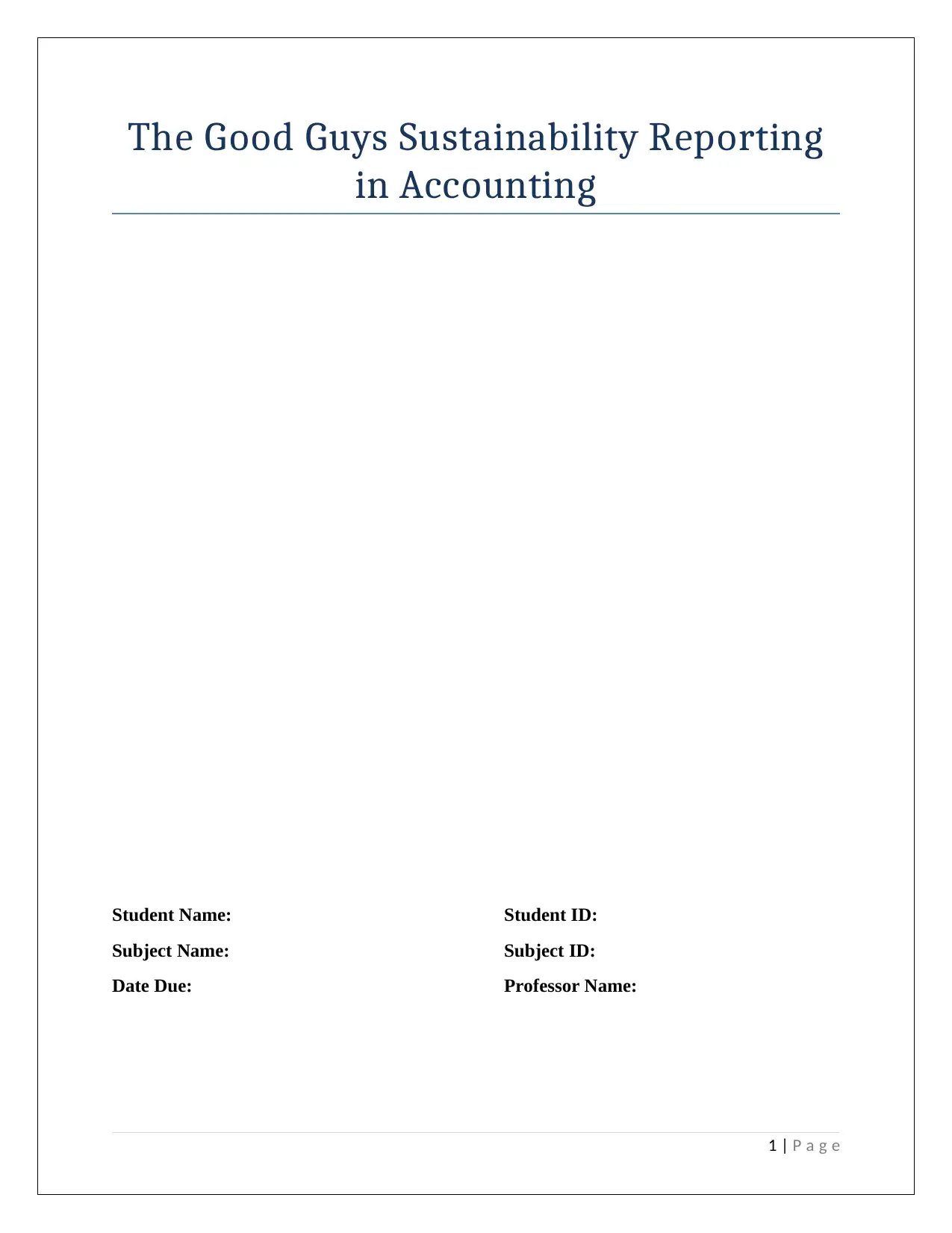
The Good Guys Sustainability Reporting
in Accounting
Student Name: Student ID:
Subject Name: Subject ID:
Date Due: Professor Name:
1 | P a g e
in Accounting
Student Name: Student ID:
Subject Name: Subject ID:
Date Due: Professor Name:
1 | P a g e
Secure Best Marks with AI Grader
Need help grading? Try our AI Grader for instant feedback on your assignments.
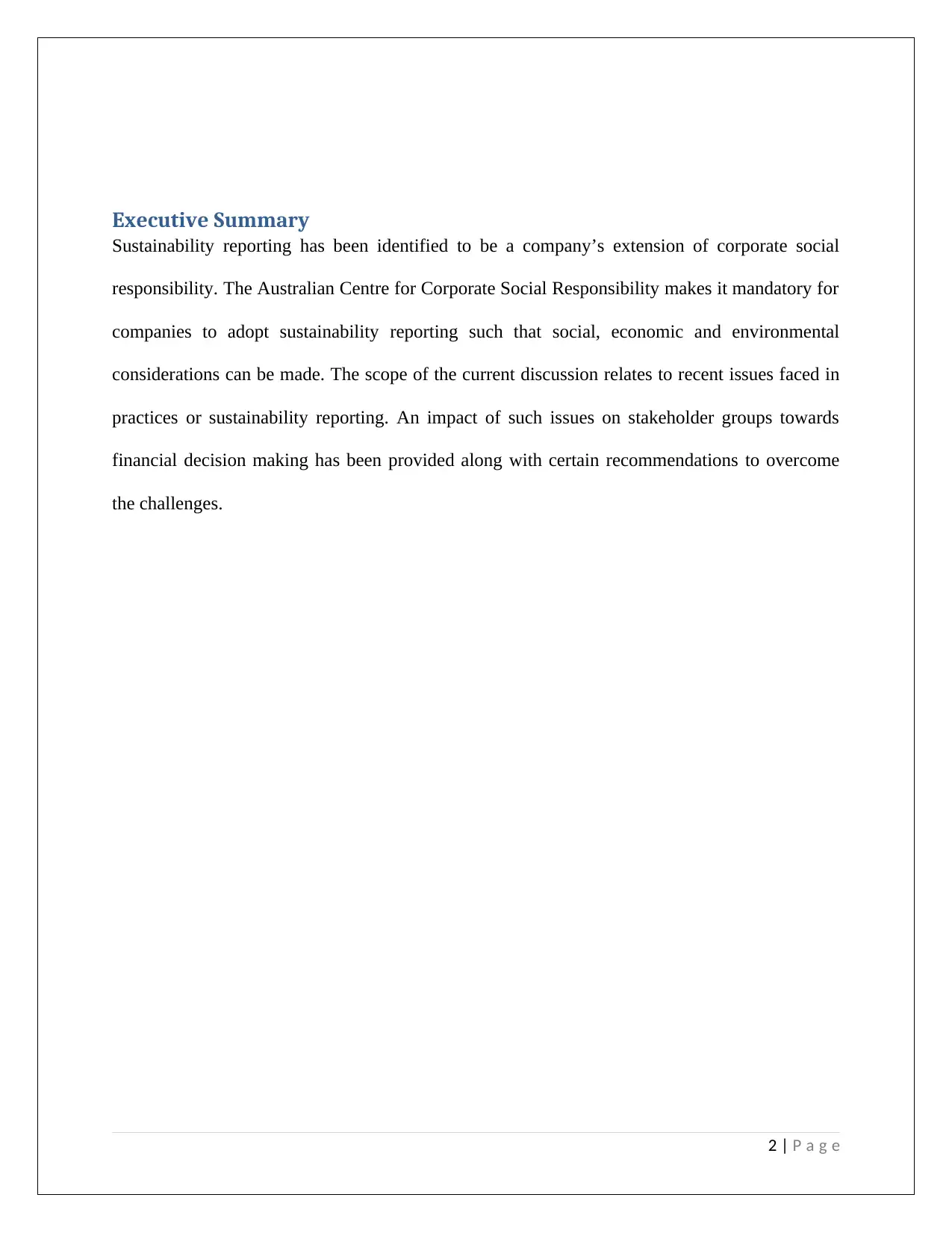
Executive Summary
Sustainability reporting has been identified to be a company’s extension of corporate social
responsibility. The Australian Centre for Corporate Social Responsibility makes it mandatory for
companies to adopt sustainability reporting such that social, economic and environmental
considerations can be made. The scope of the current discussion relates to recent issues faced in
practices or sustainability reporting. An impact of such issues on stakeholder groups towards
financial decision making has been provided along with certain recommendations to overcome
the challenges.
2 | P a g e
Sustainability reporting has been identified to be a company’s extension of corporate social
responsibility. The Australian Centre for Corporate Social Responsibility makes it mandatory for
companies to adopt sustainability reporting such that social, economic and environmental
considerations can be made. The scope of the current discussion relates to recent issues faced in
practices or sustainability reporting. An impact of such issues on stakeholder groups towards
financial decision making has been provided along with certain recommendations to overcome
the challenges.
2 | P a g e
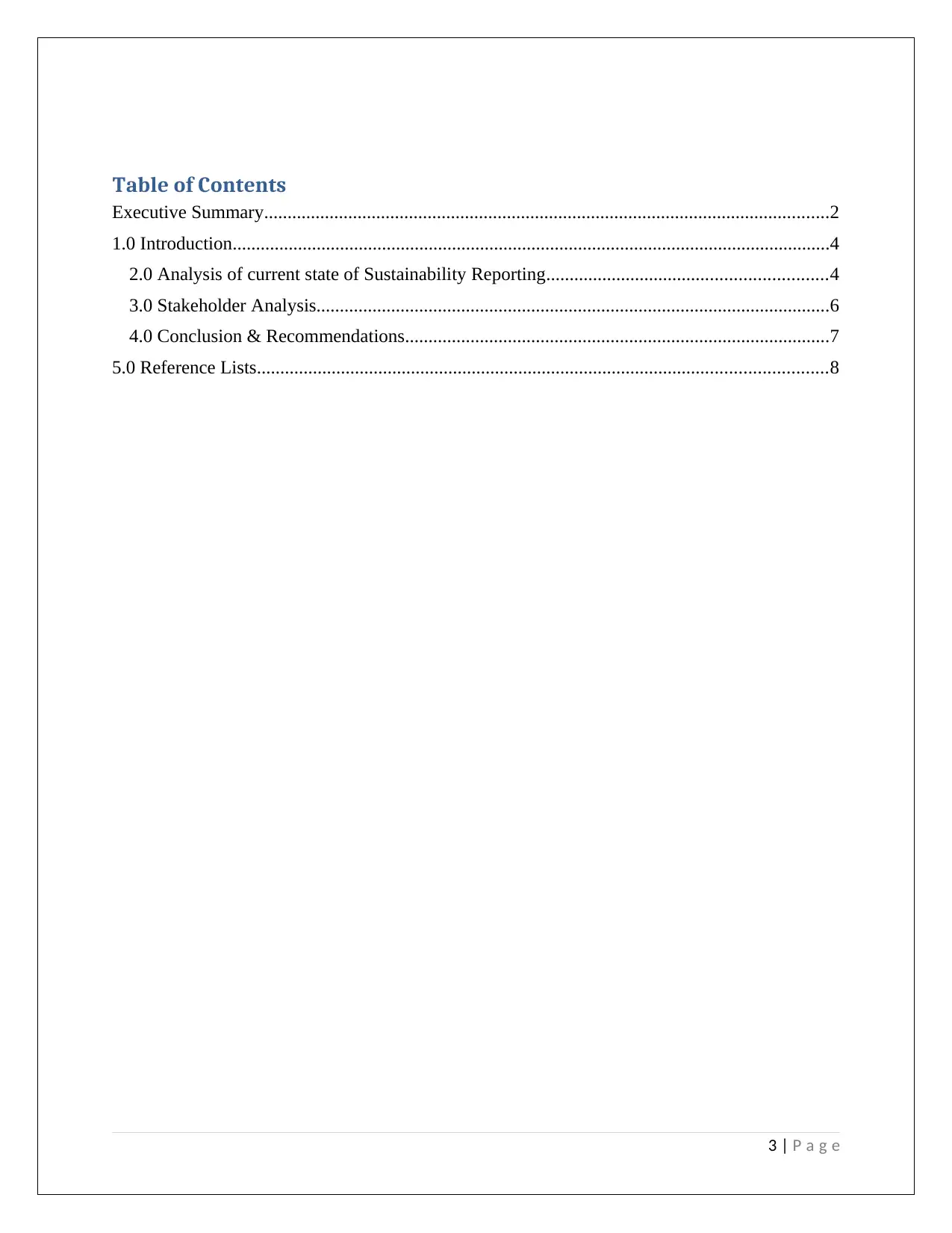
Table of Contents
Executive Summary.........................................................................................................................2
1.0 Introduction................................................................................................................................4
2.0 Analysis of current state of Sustainability Reporting............................................................4
3.0 Stakeholder Analysis..............................................................................................................6
4.0 Conclusion & Recommendations...........................................................................................7
5.0 Reference Lists..........................................................................................................................8
3 | P a g e
Executive Summary.........................................................................................................................2
1.0 Introduction................................................................................................................................4
2.0 Analysis of current state of Sustainability Reporting............................................................4
3.0 Stakeholder Analysis..............................................................................................................6
4.0 Conclusion & Recommendations...........................................................................................7
5.0 Reference Lists..........................................................................................................................8
3 | P a g e
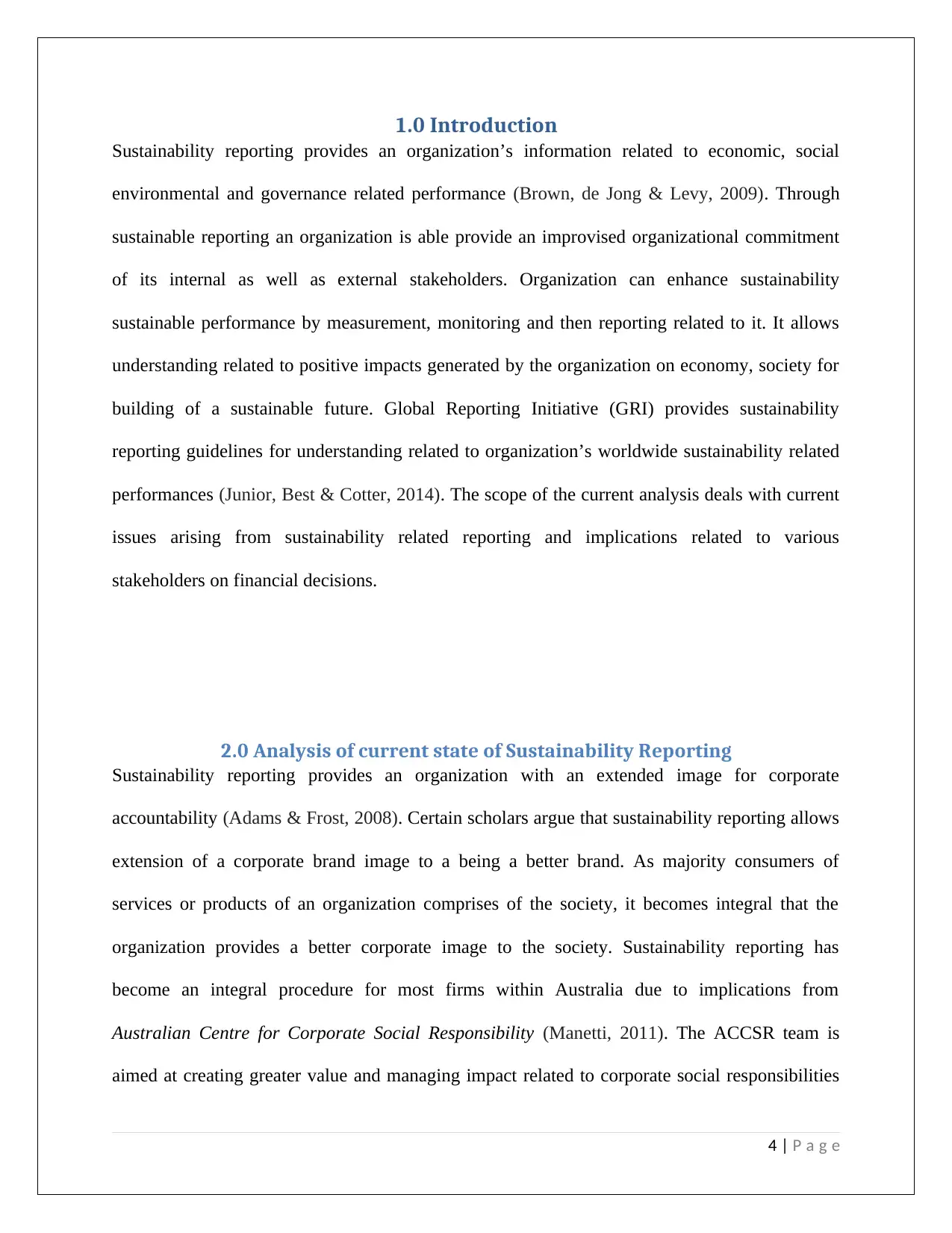
1.0 Introduction
Sustainability reporting provides an organization’s information related to economic, social
environmental and governance related performance (Brown, de Jong & Levy, 2009). Through
sustainable reporting an organization is able provide an improvised organizational commitment
of its internal as well as external stakeholders. Organization can enhance sustainability
sustainable performance by measurement, monitoring and then reporting related to it. It allows
understanding related to positive impacts generated by the organization on economy, society for
building of a sustainable future. Global Reporting Initiative (GRI) provides sustainability
reporting guidelines for understanding related to organization’s worldwide sustainability related
performances (Junior, Best & Cotter, 2014). The scope of the current analysis deals with current
issues arising from sustainability related reporting and implications related to various
stakeholders on financial decisions.
2.0 Analysis of current state of Sustainability Reporting
Sustainability reporting provides an organization with an extended image for corporate
accountability (Adams & Frost, 2008). Certain scholars argue that sustainability reporting allows
extension of a corporate brand image to a being a better brand. As majority consumers of
services or products of an organization comprises of the society, it becomes integral that the
organization provides a better corporate image to the society. Sustainability reporting has
become an integral procedure for most firms within Australia due to implications from
Australian Centre for Corporate Social Responsibility (Manetti, 2011). The ACCSR team is
aimed at creating greater value and managing impact related to corporate social responsibilities
4 | P a g e
Sustainability reporting provides an organization’s information related to economic, social
environmental and governance related performance (Brown, de Jong & Levy, 2009). Through
sustainable reporting an organization is able provide an improvised organizational commitment
of its internal as well as external stakeholders. Organization can enhance sustainability
sustainable performance by measurement, monitoring and then reporting related to it. It allows
understanding related to positive impacts generated by the organization on economy, society for
building of a sustainable future. Global Reporting Initiative (GRI) provides sustainability
reporting guidelines for understanding related to organization’s worldwide sustainability related
performances (Junior, Best & Cotter, 2014). The scope of the current analysis deals with current
issues arising from sustainability related reporting and implications related to various
stakeholders on financial decisions.
2.0 Analysis of current state of Sustainability Reporting
Sustainability reporting provides an organization with an extended image for corporate
accountability (Adams & Frost, 2008). Certain scholars argue that sustainability reporting allows
extension of a corporate brand image to a being a better brand. As majority consumers of
services or products of an organization comprises of the society, it becomes integral that the
organization provides a better corporate image to the society. Sustainability reporting has
become an integral procedure for most firms within Australia due to implications from
Australian Centre for Corporate Social Responsibility (Manetti, 2011). The ACCSR team is
aimed at creating greater value and managing impact related to corporate social responsibilities
4 | P a g e
Secure Best Marks with AI Grader
Need help grading? Try our AI Grader for instant feedback on your assignments.
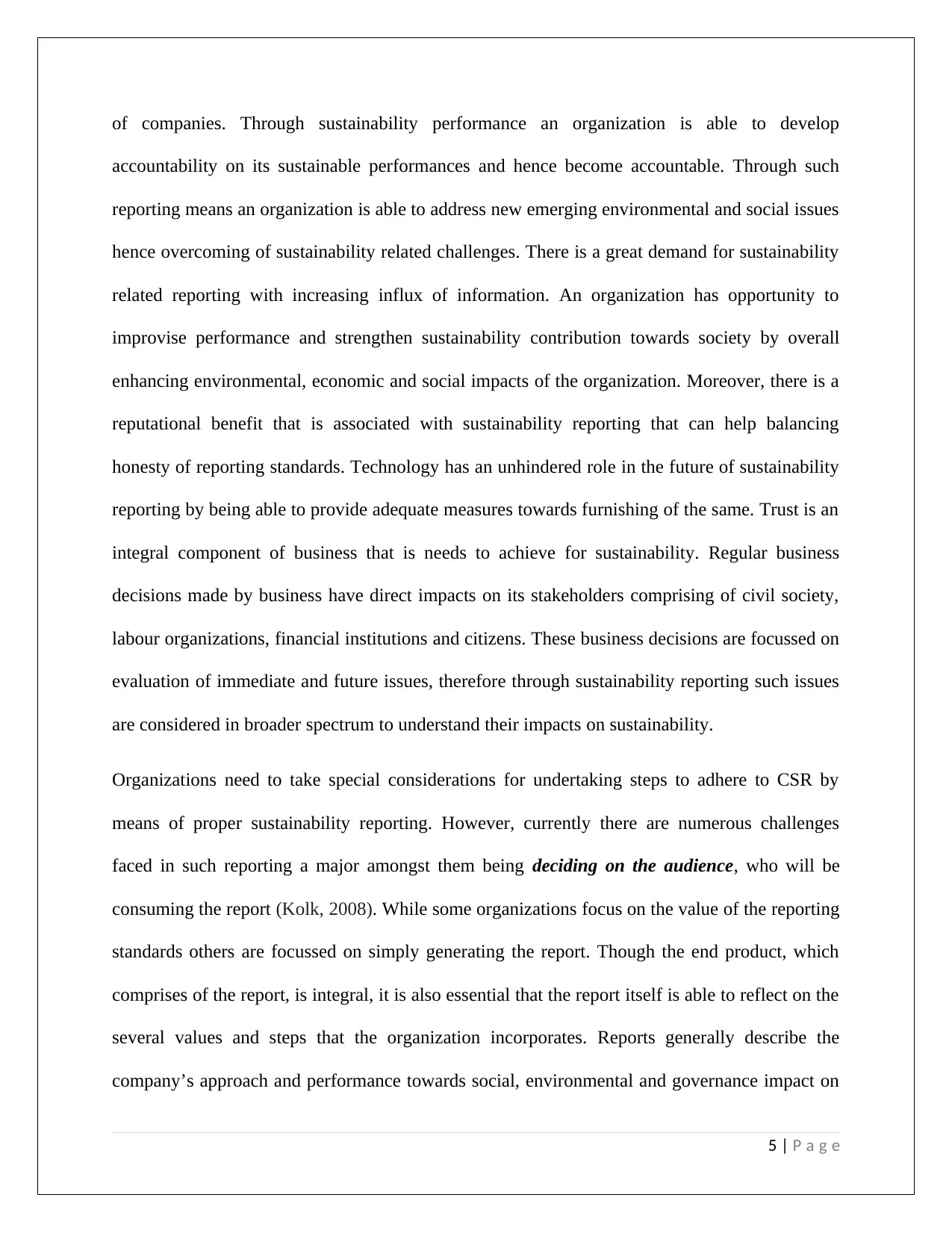
of companies. Through sustainability performance an organization is able to develop
accountability on its sustainable performances and hence become accountable. Through such
reporting means an organization is able to address new emerging environmental and social issues
hence overcoming of sustainability related challenges. There is a great demand for sustainability
related reporting with increasing influx of information. An organization has opportunity to
improvise performance and strengthen sustainability contribution towards society by overall
enhancing environmental, economic and social impacts of the organization. Moreover, there is a
reputational benefit that is associated with sustainability reporting that can help balancing
honesty of reporting standards. Technology has an unhindered role in the future of sustainability
reporting by being able to provide adequate measures towards furnishing of the same. Trust is an
integral component of business that is needs to achieve for sustainability. Regular business
decisions made by business have direct impacts on its stakeholders comprising of civil society,
labour organizations, financial institutions and citizens. These business decisions are focussed on
evaluation of immediate and future issues, therefore through sustainability reporting such issues
are considered in broader spectrum to understand their impacts on sustainability.
Organizations need to take special considerations for undertaking steps to adhere to CSR by
means of proper sustainability reporting. However, currently there are numerous challenges
faced in such reporting a major amongst them being deciding on the audience, who will be
consuming the report (Kolk, 2008). While some organizations focus on the value of the reporting
standards others are focussed on simply generating the report. Though the end product, which
comprises of the report, is integral, it is also essential that the report itself is able to reflect on the
several values and steps that the organization incorporates. Reports generally describe the
company’s approach and performance towards social, environmental and governance impact on
5 | P a g e
accountability on its sustainable performances and hence become accountable. Through such
reporting means an organization is able to address new emerging environmental and social issues
hence overcoming of sustainability related challenges. There is a great demand for sustainability
related reporting with increasing influx of information. An organization has opportunity to
improvise performance and strengthen sustainability contribution towards society by overall
enhancing environmental, economic and social impacts of the organization. Moreover, there is a
reputational benefit that is associated with sustainability reporting that can help balancing
honesty of reporting standards. Technology has an unhindered role in the future of sustainability
reporting by being able to provide adequate measures towards furnishing of the same. Trust is an
integral component of business that is needs to achieve for sustainability. Regular business
decisions made by business have direct impacts on its stakeholders comprising of civil society,
labour organizations, financial institutions and citizens. These business decisions are focussed on
evaluation of immediate and future issues, therefore through sustainability reporting such issues
are considered in broader spectrum to understand their impacts on sustainability.
Organizations need to take special considerations for undertaking steps to adhere to CSR by
means of proper sustainability reporting. However, currently there are numerous challenges
faced in such reporting a major amongst them being deciding on the audience, who will be
consuming the report (Kolk, 2008). While some organizations focus on the value of the reporting
standards others are focussed on simply generating the report. Though the end product, which
comprises of the report, is integral, it is also essential that the report itself is able to reflect on the
several values and steps that the organization incorporates. Reports generally describe the
company’s approach and performance towards social, environmental and governance impact on
5 | P a g e
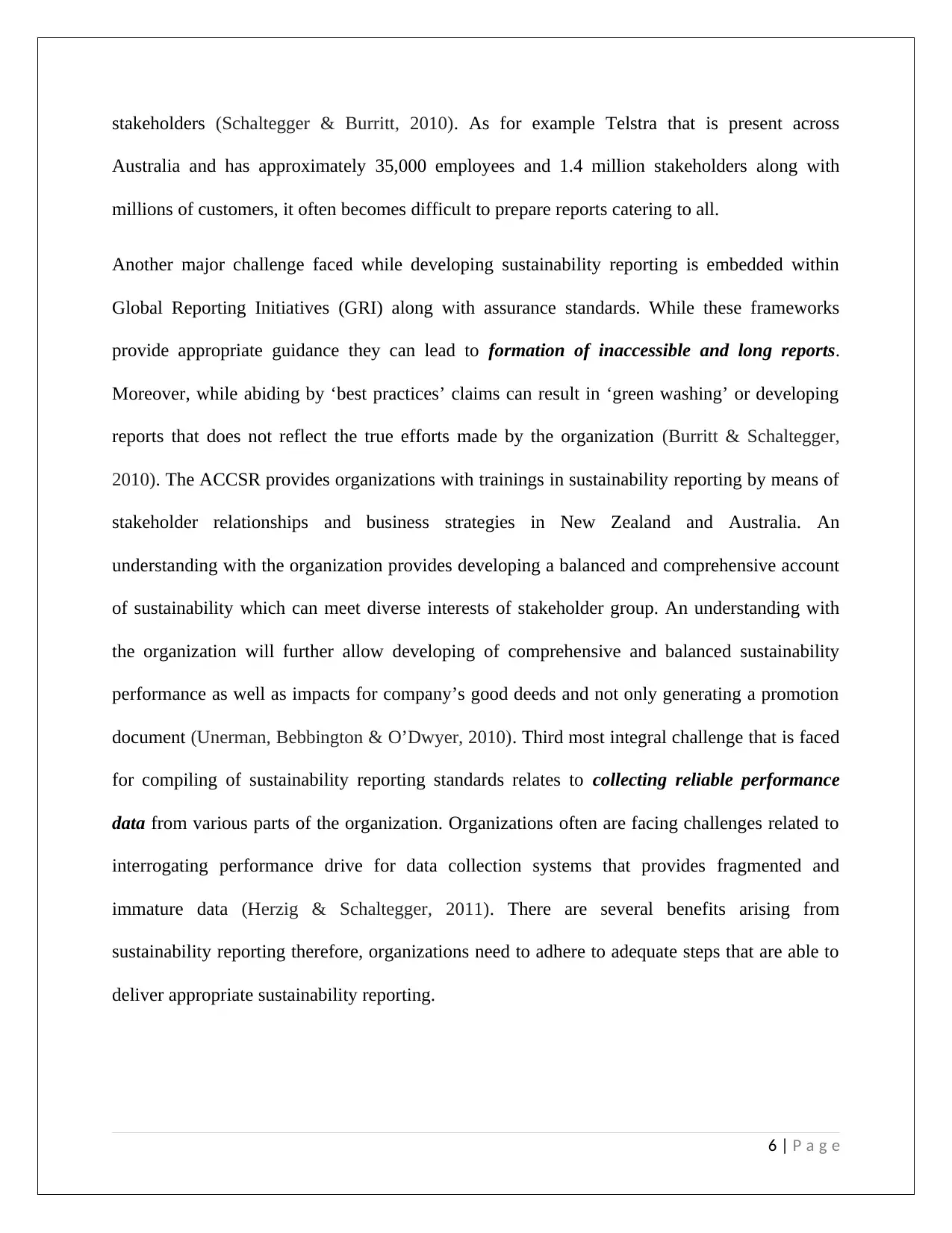
stakeholders (Schaltegger & Burritt, 2010). As for example Telstra that is present across
Australia and has approximately 35,000 employees and 1.4 million stakeholders along with
millions of customers, it often becomes difficult to prepare reports catering to all.
Another major challenge faced while developing sustainability reporting is embedded within
Global Reporting Initiatives (GRI) along with assurance standards. While these frameworks
provide appropriate guidance they can lead to formation of inaccessible and long reports.
Moreover, while abiding by ‘best practices’ claims can result in ‘green washing’ or developing
reports that does not reflect the true efforts made by the organization (Burritt & Schaltegger,
2010). The ACCSR provides organizations with trainings in sustainability reporting by means of
stakeholder relationships and business strategies in New Zealand and Australia. An
understanding with the organization provides developing a balanced and comprehensive account
of sustainability which can meet diverse interests of stakeholder group. An understanding with
the organization will further allow developing of comprehensive and balanced sustainability
performance as well as impacts for company’s good deeds and not only generating a promotion
document (Unerman, Bebbington & O’Dwyer, 2010). Third most integral challenge that is faced
for compiling of sustainability reporting standards relates to collecting reliable performance
data from various parts of the organization. Organizations often are facing challenges related to
interrogating performance drive for data collection systems that provides fragmented and
immature data (Herzig & Schaltegger, 2011). There are several benefits arising from
sustainability reporting therefore, organizations need to adhere to adequate steps that are able to
deliver appropriate sustainability reporting.
6 | P a g e
Australia and has approximately 35,000 employees and 1.4 million stakeholders along with
millions of customers, it often becomes difficult to prepare reports catering to all.
Another major challenge faced while developing sustainability reporting is embedded within
Global Reporting Initiatives (GRI) along with assurance standards. While these frameworks
provide appropriate guidance they can lead to formation of inaccessible and long reports.
Moreover, while abiding by ‘best practices’ claims can result in ‘green washing’ or developing
reports that does not reflect the true efforts made by the organization (Burritt & Schaltegger,
2010). The ACCSR provides organizations with trainings in sustainability reporting by means of
stakeholder relationships and business strategies in New Zealand and Australia. An
understanding with the organization provides developing a balanced and comprehensive account
of sustainability which can meet diverse interests of stakeholder group. An understanding with
the organization will further allow developing of comprehensive and balanced sustainability
performance as well as impacts for company’s good deeds and not only generating a promotion
document (Unerman, Bebbington & O’Dwyer, 2010). Third most integral challenge that is faced
for compiling of sustainability reporting standards relates to collecting reliable performance
data from various parts of the organization. Organizations often are facing challenges related to
interrogating performance drive for data collection systems that provides fragmented and
immature data (Herzig & Schaltegger, 2011). There are several benefits arising from
sustainability reporting therefore, organizations need to adhere to adequate steps that are able to
deliver appropriate sustainability reporting.
6 | P a g e
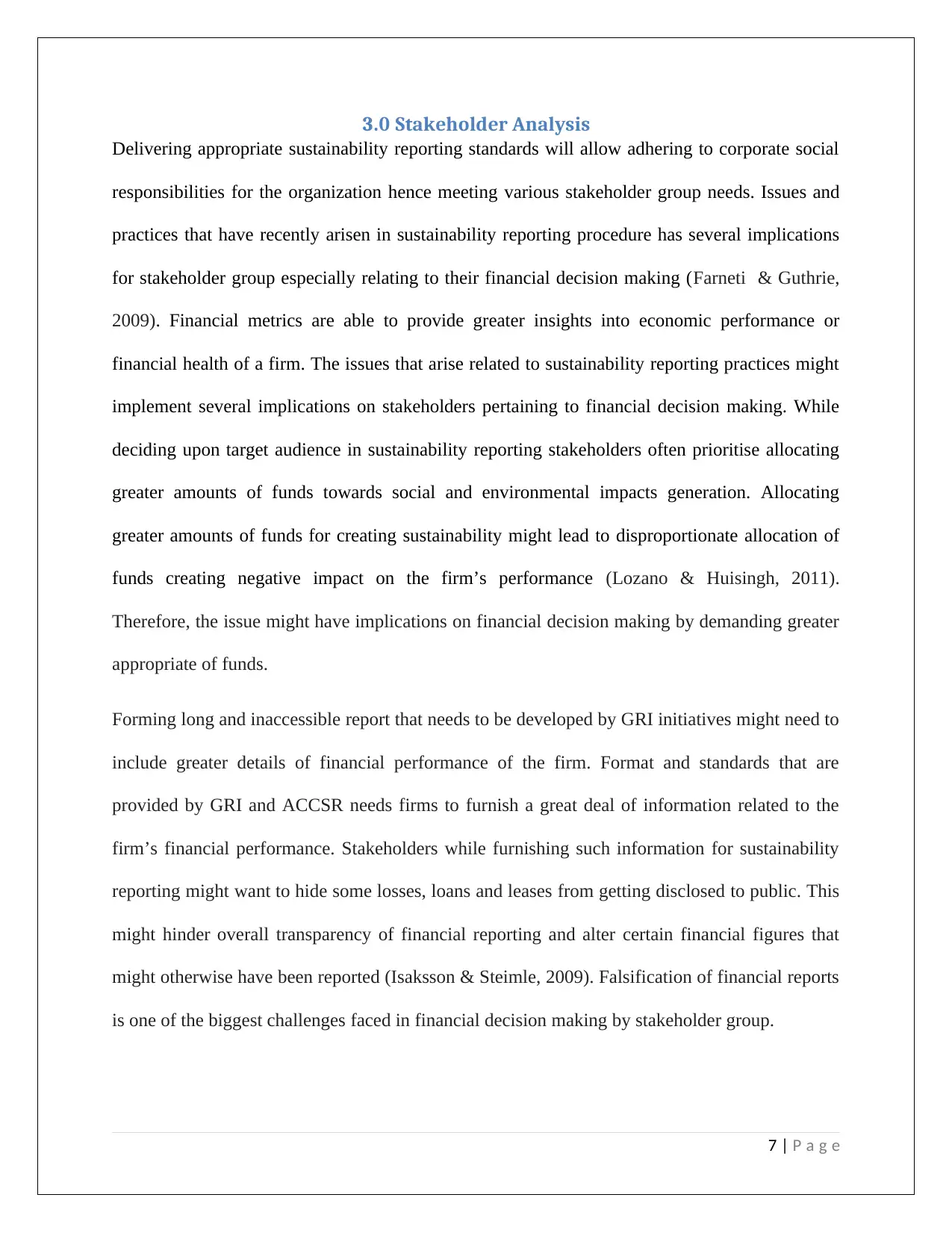
3.0 Stakeholder Analysis
Delivering appropriate sustainability reporting standards will allow adhering to corporate social
responsibilities for the organization hence meeting various stakeholder group needs. Issues and
practices that have recently arisen in sustainability reporting procedure has several implications
for stakeholder group especially relating to their financial decision making (Farneti & Guthrie,
2009). Financial metrics are able to provide greater insights into economic performance or
financial health of a firm. The issues that arise related to sustainability reporting practices might
implement several implications on stakeholders pertaining to financial decision making. While
deciding upon target audience in sustainability reporting stakeholders often prioritise allocating
greater amounts of funds towards social and environmental impacts generation. Allocating
greater amounts of funds for creating sustainability might lead to disproportionate allocation of
funds creating negative impact on the firm’s performance (Lozano & Huisingh, 2011).
Therefore, the issue might have implications on financial decision making by demanding greater
appropriate of funds.
Forming long and inaccessible report that needs to be developed by GRI initiatives might need to
include greater details of financial performance of the firm. Format and standards that are
provided by GRI and ACCSR needs firms to furnish a great deal of information related to the
firm’s financial performance. Stakeholders while furnishing such information for sustainability
reporting might want to hide some losses, loans and leases from getting disclosed to public. This
might hinder overall transparency of financial reporting and alter certain financial figures that
might otherwise have been reported (Isaksson & Steimle, 2009). Falsification of financial reports
is one of the biggest challenges faced in financial decision making by stakeholder group.
7 | P a g e
Delivering appropriate sustainability reporting standards will allow adhering to corporate social
responsibilities for the organization hence meeting various stakeholder group needs. Issues and
practices that have recently arisen in sustainability reporting procedure has several implications
for stakeholder group especially relating to their financial decision making (Farneti & Guthrie,
2009). Financial metrics are able to provide greater insights into economic performance or
financial health of a firm. The issues that arise related to sustainability reporting practices might
implement several implications on stakeholders pertaining to financial decision making. While
deciding upon target audience in sustainability reporting stakeholders often prioritise allocating
greater amounts of funds towards social and environmental impacts generation. Allocating
greater amounts of funds for creating sustainability might lead to disproportionate allocation of
funds creating negative impact on the firm’s performance (Lozano & Huisingh, 2011).
Therefore, the issue might have implications on financial decision making by demanding greater
appropriate of funds.
Forming long and inaccessible report that needs to be developed by GRI initiatives might need to
include greater details of financial performance of the firm. Format and standards that are
provided by GRI and ACCSR needs firms to furnish a great deal of information related to the
firm’s financial performance. Stakeholders while furnishing such information for sustainability
reporting might want to hide some losses, loans and leases from getting disclosed to public. This
might hinder overall transparency of financial reporting and alter certain financial figures that
might otherwise have been reported (Isaksson & Steimle, 2009). Falsification of financial reports
is one of the biggest challenges faced in financial decision making by stakeholder group.
7 | P a g e
Paraphrase This Document
Need a fresh take? Get an instant paraphrase of this document with our AI Paraphraser
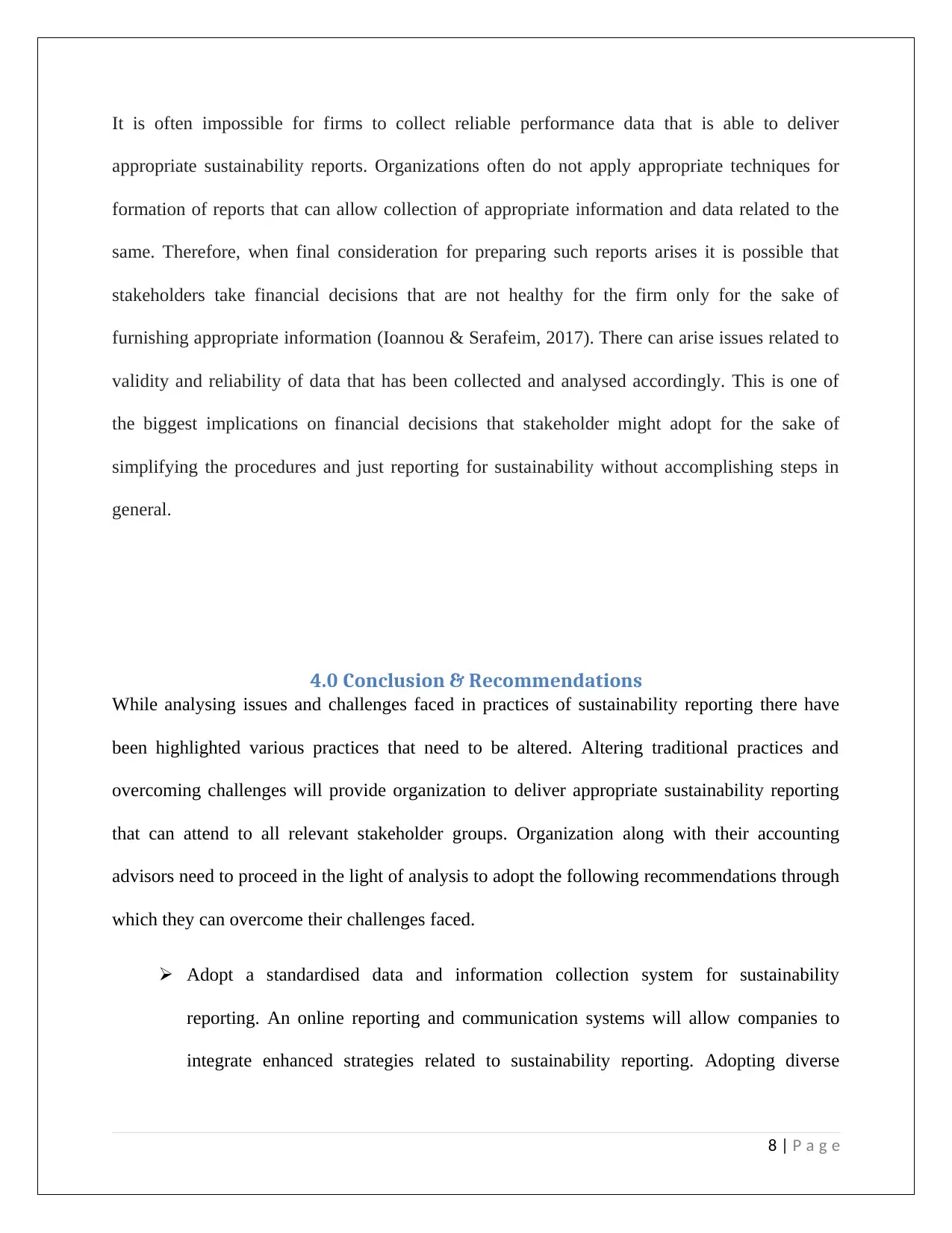
It is often impossible for firms to collect reliable performance data that is able to deliver
appropriate sustainability reports. Organizations often do not apply appropriate techniques for
formation of reports that can allow collection of appropriate information and data related to the
same. Therefore, when final consideration for preparing such reports arises it is possible that
stakeholders take financial decisions that are not healthy for the firm only for the sake of
furnishing appropriate information (Ioannou & Serafeim, 2017). There can arise issues related to
validity and reliability of data that has been collected and analysed accordingly. This is one of
the biggest implications on financial decisions that stakeholder might adopt for the sake of
simplifying the procedures and just reporting for sustainability without accomplishing steps in
general.
4.0 Conclusion & Recommendations
While analysing issues and challenges faced in practices of sustainability reporting there have
been highlighted various practices that need to be altered. Altering traditional practices and
overcoming challenges will provide organization to deliver appropriate sustainability reporting
that can attend to all relevant stakeholder groups. Organization along with their accounting
advisors need to proceed in the light of analysis to adopt the following recommendations through
which they can overcome their challenges faced.
Adopt a standardised data and information collection system for sustainability
reporting. An online reporting and communication systems will allow companies to
integrate enhanced strategies related to sustainability reporting. Adopting diverse
8 | P a g e
appropriate sustainability reports. Organizations often do not apply appropriate techniques for
formation of reports that can allow collection of appropriate information and data related to the
same. Therefore, when final consideration for preparing such reports arises it is possible that
stakeholders take financial decisions that are not healthy for the firm only for the sake of
furnishing appropriate information (Ioannou & Serafeim, 2017). There can arise issues related to
validity and reliability of data that has been collected and analysed accordingly. This is one of
the biggest implications on financial decisions that stakeholder might adopt for the sake of
simplifying the procedures and just reporting for sustainability without accomplishing steps in
general.
4.0 Conclusion & Recommendations
While analysing issues and challenges faced in practices of sustainability reporting there have
been highlighted various practices that need to be altered. Altering traditional practices and
overcoming challenges will provide organization to deliver appropriate sustainability reporting
that can attend to all relevant stakeholder groups. Organization along with their accounting
advisors need to proceed in the light of analysis to adopt the following recommendations through
which they can overcome their challenges faced.
Adopt a standardised data and information collection system for sustainability
reporting. An online reporting and communication systems will allow companies to
integrate enhanced strategies related to sustainability reporting. Adopting diverse
8 | P a g e
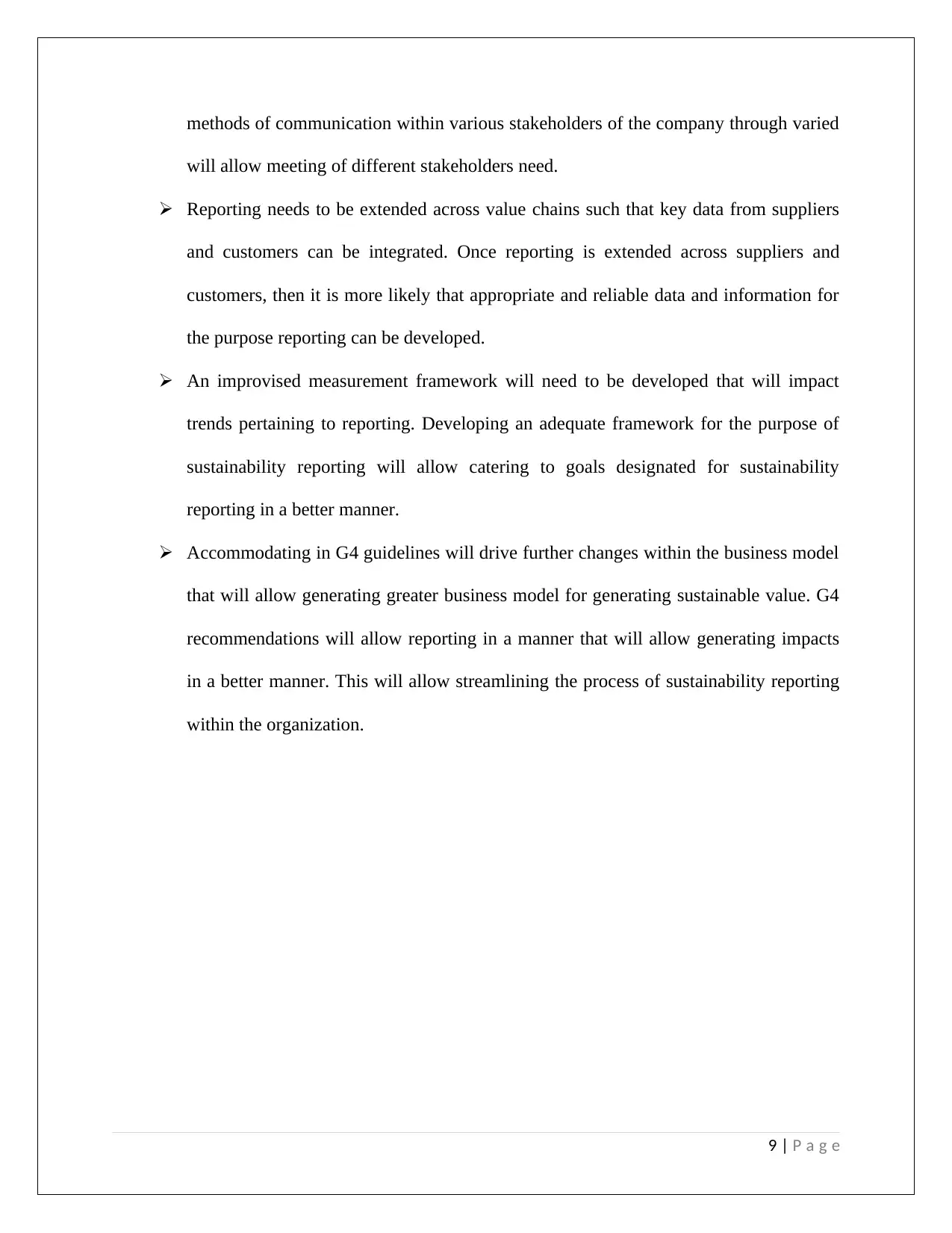
methods of communication within various stakeholders of the company through varied
will allow meeting of different stakeholders need.
Reporting needs to be extended across value chains such that key data from suppliers
and customers can be integrated. Once reporting is extended across suppliers and
customers, then it is more likely that appropriate and reliable data and information for
the purpose reporting can be developed.
An improvised measurement framework will need to be developed that will impact
trends pertaining to reporting. Developing an adequate framework for the purpose of
sustainability reporting will allow catering to goals designated for sustainability
reporting in a better manner.
Accommodating in G4 guidelines will drive further changes within the business model
that will allow generating greater business model for generating sustainable value. G4
recommendations will allow reporting in a manner that will allow generating impacts
in a better manner. This will allow streamlining the process of sustainability reporting
within the organization.
9 | P a g e
will allow meeting of different stakeholders need.
Reporting needs to be extended across value chains such that key data from suppliers
and customers can be integrated. Once reporting is extended across suppliers and
customers, then it is more likely that appropriate and reliable data and information for
the purpose reporting can be developed.
An improvised measurement framework will need to be developed that will impact
trends pertaining to reporting. Developing an adequate framework for the purpose of
sustainability reporting will allow catering to goals designated for sustainability
reporting in a better manner.
Accommodating in G4 guidelines will drive further changes within the business model
that will allow generating greater business model for generating sustainable value. G4
recommendations will allow reporting in a manner that will allow generating impacts
in a better manner. This will allow streamlining the process of sustainability reporting
within the organization.
9 | P a g e
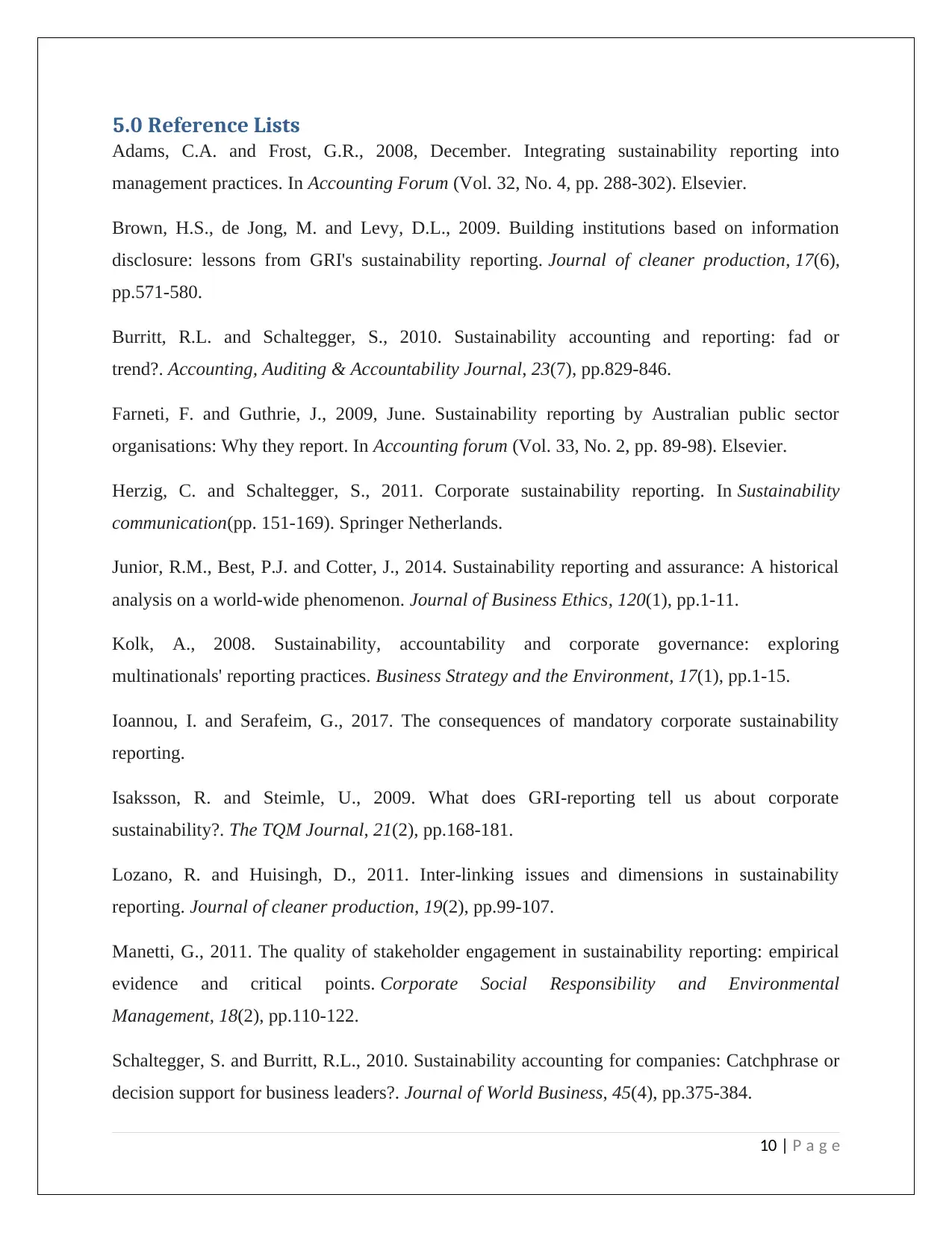
5.0 Reference Lists
Adams, C.A. and Frost, G.R., 2008, December. Integrating sustainability reporting into
management practices. In Accounting Forum (Vol. 32, No. 4, pp. 288-302). Elsevier.
Brown, H.S., de Jong, M. and Levy, D.L., 2009. Building institutions based on information
disclosure: lessons from GRI's sustainability reporting. Journal of cleaner production, 17(6),
pp.571-580.
Burritt, R.L. and Schaltegger, S., 2010. Sustainability accounting and reporting: fad or
trend?. Accounting, Auditing & Accountability Journal, 23(7), pp.829-846.
Farneti, F. and Guthrie, J., 2009, June. Sustainability reporting by Australian public sector
organisations: Why they report. In Accounting forum (Vol. 33, No. 2, pp. 89-98). Elsevier.
Herzig, C. and Schaltegger, S., 2011. Corporate sustainability reporting. In Sustainability
communication(pp. 151-169). Springer Netherlands.
Junior, R.M., Best, P.J. and Cotter, J., 2014. Sustainability reporting and assurance: A historical
analysis on a world-wide phenomenon. Journal of Business Ethics, 120(1), pp.1-11.
Kolk, A., 2008. Sustainability, accountability and corporate governance: exploring
multinationals' reporting practices. Business Strategy and the Environment, 17(1), pp.1-15.
Ioannou, I. and Serafeim, G., 2017. The consequences of mandatory corporate sustainability
reporting.
Isaksson, R. and Steimle, U., 2009. What does GRI-reporting tell us about corporate
sustainability?. The TQM Journal, 21(2), pp.168-181.
Lozano, R. and Huisingh, D., 2011. Inter-linking issues and dimensions in sustainability
reporting. Journal of cleaner production, 19(2), pp.99-107.
Manetti, G., 2011. The quality of stakeholder engagement in sustainability reporting: empirical
evidence and critical points. Corporate Social Responsibility and Environmental
Management, 18(2), pp.110-122.
Schaltegger, S. and Burritt, R.L., 2010. Sustainability accounting for companies: Catchphrase or
decision support for business leaders?. Journal of World Business, 45(4), pp.375-384.
10 | P a g e
Adams, C.A. and Frost, G.R., 2008, December. Integrating sustainability reporting into
management practices. In Accounting Forum (Vol. 32, No. 4, pp. 288-302). Elsevier.
Brown, H.S., de Jong, M. and Levy, D.L., 2009. Building institutions based on information
disclosure: lessons from GRI's sustainability reporting. Journal of cleaner production, 17(6),
pp.571-580.
Burritt, R.L. and Schaltegger, S., 2010. Sustainability accounting and reporting: fad or
trend?. Accounting, Auditing & Accountability Journal, 23(7), pp.829-846.
Farneti, F. and Guthrie, J., 2009, June. Sustainability reporting by Australian public sector
organisations: Why they report. In Accounting forum (Vol. 33, No. 2, pp. 89-98). Elsevier.
Herzig, C. and Schaltegger, S., 2011. Corporate sustainability reporting. In Sustainability
communication(pp. 151-169). Springer Netherlands.
Junior, R.M., Best, P.J. and Cotter, J., 2014. Sustainability reporting and assurance: A historical
analysis on a world-wide phenomenon. Journal of Business Ethics, 120(1), pp.1-11.
Kolk, A., 2008. Sustainability, accountability and corporate governance: exploring
multinationals' reporting practices. Business Strategy and the Environment, 17(1), pp.1-15.
Ioannou, I. and Serafeim, G., 2017. The consequences of mandatory corporate sustainability
reporting.
Isaksson, R. and Steimle, U., 2009. What does GRI-reporting tell us about corporate
sustainability?. The TQM Journal, 21(2), pp.168-181.
Lozano, R. and Huisingh, D., 2011. Inter-linking issues and dimensions in sustainability
reporting. Journal of cleaner production, 19(2), pp.99-107.
Manetti, G., 2011. The quality of stakeholder engagement in sustainability reporting: empirical
evidence and critical points. Corporate Social Responsibility and Environmental
Management, 18(2), pp.110-122.
Schaltegger, S. and Burritt, R.L., 2010. Sustainability accounting for companies: Catchphrase or
decision support for business leaders?. Journal of World Business, 45(4), pp.375-384.
10 | P a g e
Secure Best Marks with AI Grader
Need help grading? Try our AI Grader for instant feedback on your assignments.
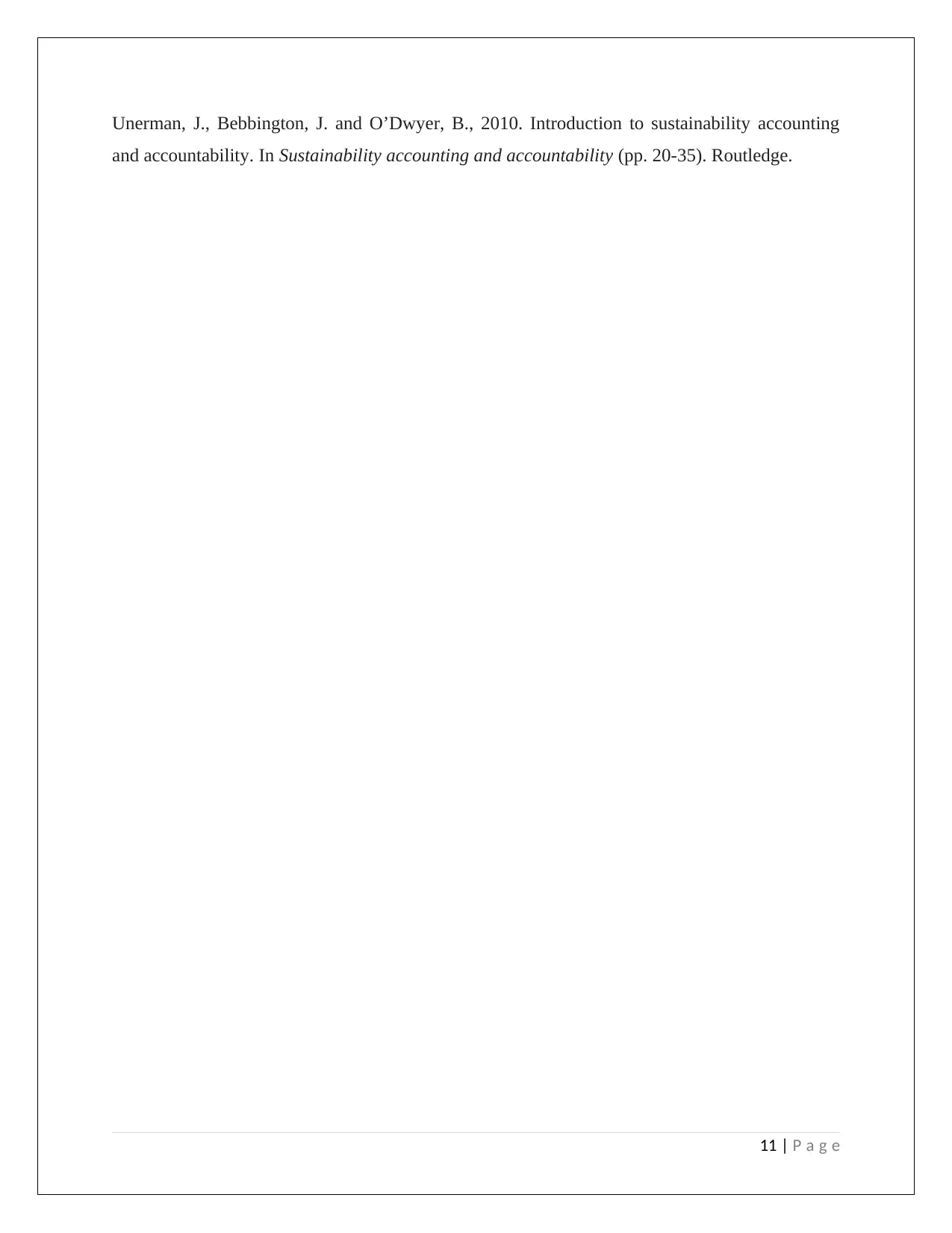
Unerman, J., Bebbington, J. and O’Dwyer, B., 2010. Introduction to sustainability accounting
and accountability. In Sustainability accounting and accountability (pp. 20-35). Routledge.
11 | P a g e
and accountability. In Sustainability accounting and accountability (pp. 20-35). Routledge.
11 | P a g e
1 out of 11
Related Documents
Your All-in-One AI-Powered Toolkit for Academic Success.
+13062052269
info@desklib.com
Available 24*7 on WhatsApp / Email
![[object Object]](/_next/static/media/star-bottom.7253800d.svg)
Unlock your academic potential
© 2024 | Zucol Services PVT LTD | All rights reserved.





